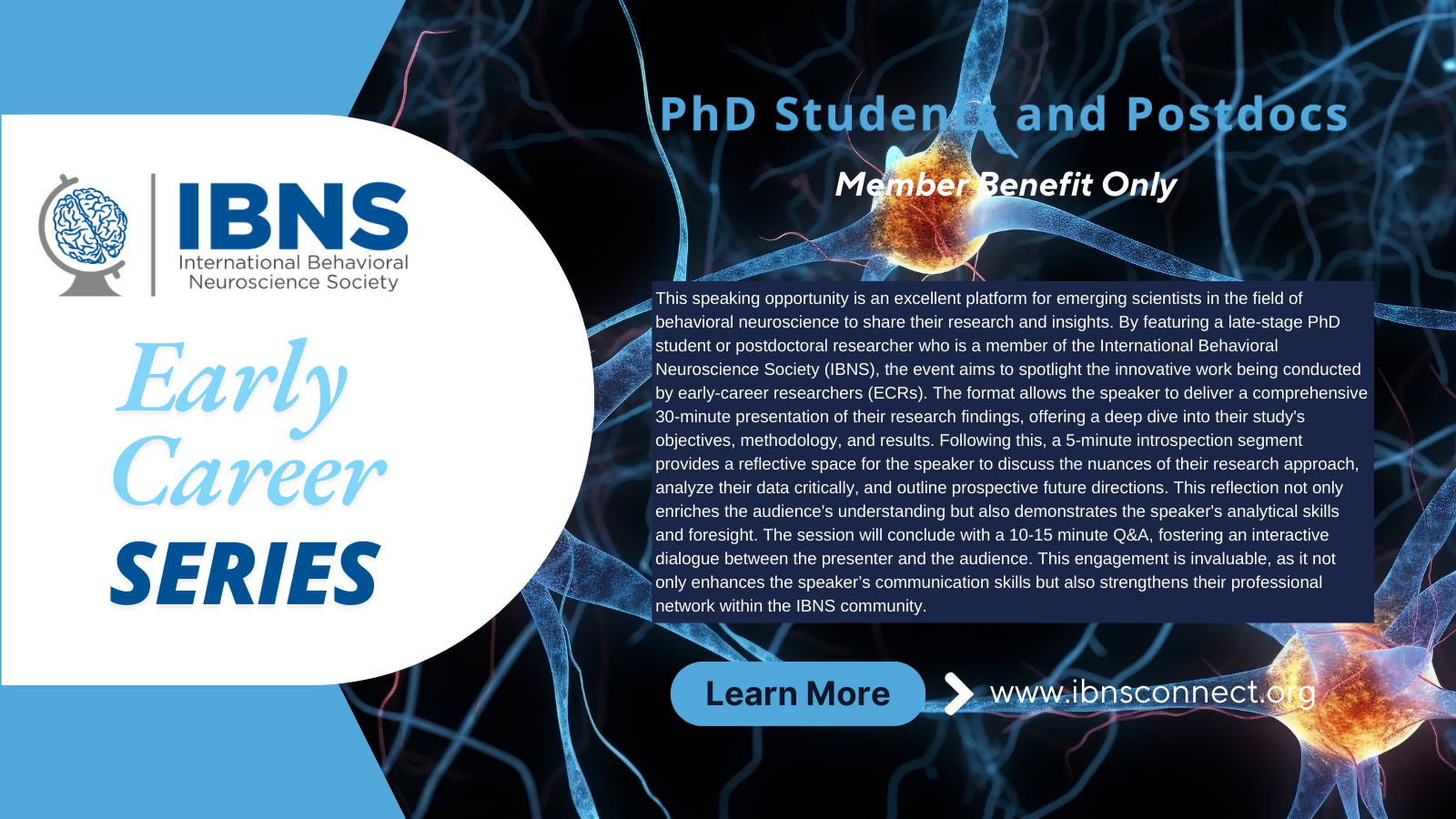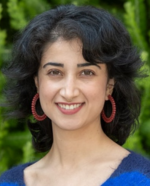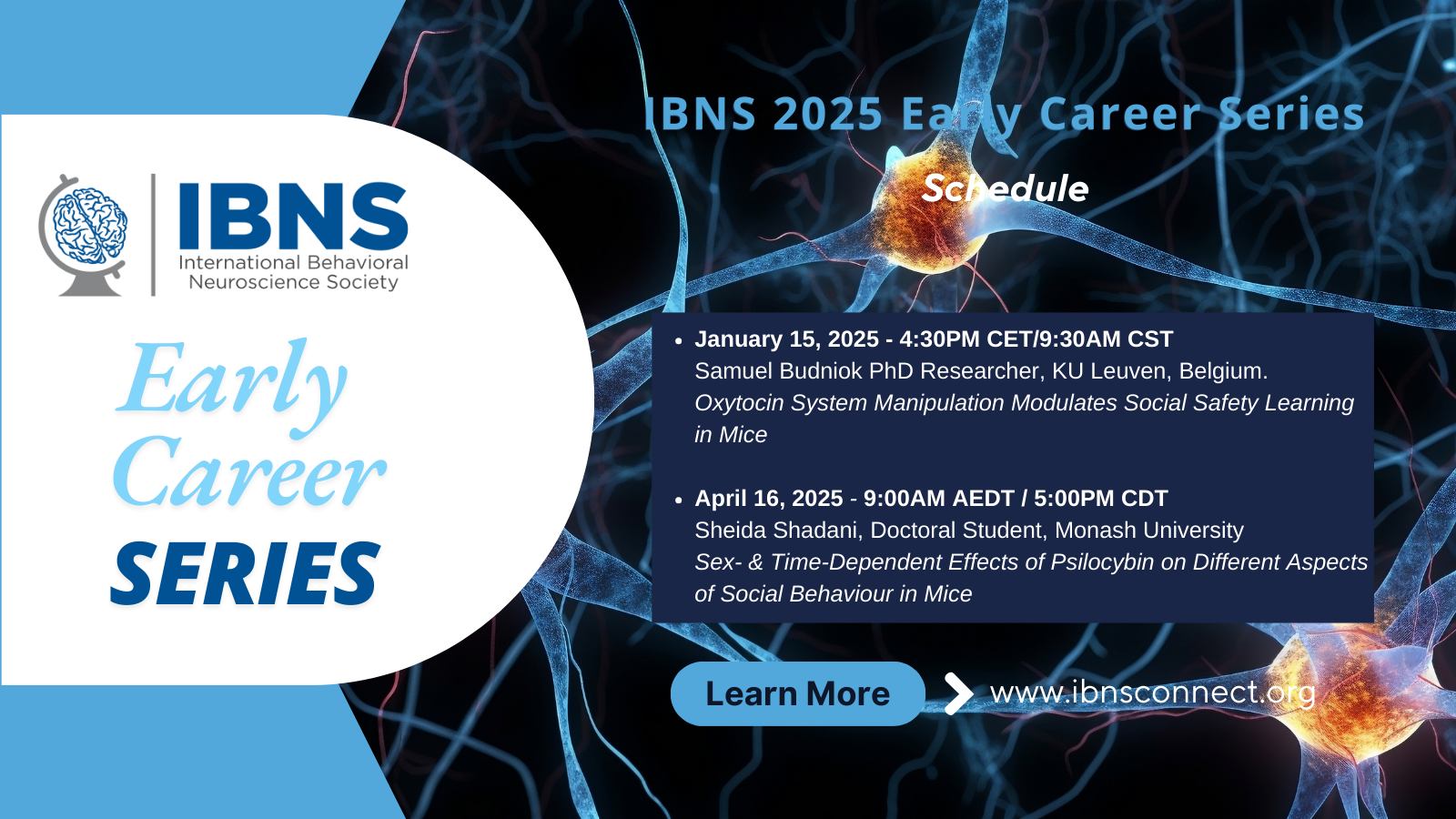|

Join us LIVE - the NEW IBNS Early Career Series
April 17, 2025 at 8:00AM Melbourne Time / April 16, 2025 at 5:00PM Central Time U.S.
Hosted by: Haven Predale & Sade Spencer
The International Behavioral Neuroscience Society is pleased to announce the first speaker in the
IBNS 2025 Early Career Series, specifically designed for early-career researchers.

Sheida Shadani
Doctoral Student in the Physiology Department at Monash University
Melbourne, Australia
Sex- & Time-Dependent Effects of Psilocybin on Different Aspects of Social Behaviour in Mice
Sheida Shadani is a doctoral student in the Physiology Department at Monash University. Sheida has a strong interest in the behavioral neuroscience field, where they have studied schizophrenia and the gut microbiota during undergraduate studies and now investigates the neural processes of eating disorders as a part of their dissertation project. This stellar work is represented in two publications, one in Endocrinology and the other under review. Aside from Sheida’s research, they have consistently engaged with the community and participated in teaching and mentoring, promoting several E&D initiatives. Sheida is a committee member of the PsychedelicX at Intercollegiate Psychedelicsilocybin Network and QueersInScience groups, a mentee at STEMsisters, and was the event manager of the Students of Brain Research committee. On April 16th, Shedia will present work on sex-and time-dependent effects of psilocybin on social behaviors.
Registration is FREE and you do not need to be a member!
CALL for SPEAKERS
2025 IBNS Early Career Series
This speaking opportunity is an excellent platform for emerging scientists in the field of behavioral neuroscience to share their research and insights. By featuring a late-stage PhD student or postdoctoral researcher who is a member of the International Behavioral Neuroscience Society (IBNS), the event aims to spotlight the innovative work being conducted by early-career researchers (ECRs). The format allows the speaker to deliver a comprehensive 30-minute presentation of their research findings, offering a deep dive into their study's objectives, methodology, and results. Following this, a 5-minute introspection segment provides a reflective space for the speaker to discuss the nuances of their research approach, analyze their data critically, and outline prospective future directions. This reflection not only enriches the audience's understanding but also demonstrates the speaker's analytical skills and foresight. The session will conclude with a 10-15 minute Q&A, fostering an interactive dialogue between the presenter and the audience. This engagement is invaluable, as it not only enhances the speaker’s communication skills but also strengthens their professional network within the IBNS community.
We will feature one speaker who is either a late-stage PhD student or a postdoctoral researcher. Speakers must be IBNS members. The speaker will have 30 minutes to present their research, followed by 5 minutes of introspection about their own methods, data, and future directions, and finish off with a 10-15 minute Q&A. This will provide the selected early career researcher (ECR) with a unique opportunity to engage with the IBNS membership. If you’re interested in being a speaker, please submit a 200-word abstract of your research and a 150-word diversity statement. Complete your application here or by clicking the button below.
Your abstract should clearly articulate your research question and approach, the interpretation of your findings and their implications, the innovativeness and impact of these findings, and should incorporate behavior.
For the diversity statement, you should describe ways in which you have made efforts or plan to make future efforts to promote diversity and inclusion, with regards to culture, ethnicity, gender identity or expression, national origin, physical or mental difference, politics, race, religion, sex, sexual orientation, socio-economic status, and/or subculture, as described in the IBNS Diversity Statement. A statement evaluated as Outstanding would include specific examples (e.g. partnering organizations, collaborators, and/or applicant led-initiatives/programs) of things that have been done or being planned, as well as a clear explanation how these examples promote diversity and inclusion within the field of behavioral neuroscience. Your diversity statement will remain private among the few members reviewing the applications. Nothing in the diversity statement will be made public.

|